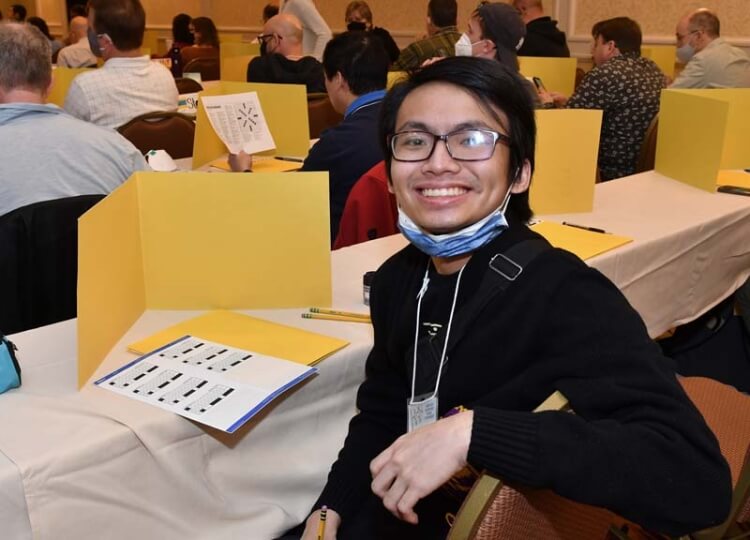Paolo Pasco, A.B. ’22
Crossword puzzlers tend to fall into two camps, according to Paolo Pasco.
One camp likes logic and structure. The other camp includes people who enjoy clever word play, like the Harvard students Pasco knew through Hasty Pudding Theatricals and the “Harvard Lampoon.”
If anyone would know about crossword puzzlers, it’s Pasco, A.B. '22, a computer science concentrator at the Harvard John A. Paulson School of Engineering and Applied Sciences (SEAS). He’s been solving and constructing his own crosswords since long before he came to Harvard. His puzzles have been published by The Atlantic, The New York Times, Los Angeles Times, Wall Street Journal and USA Today, among others. He became The Atlantic’s assistant crossword editor while still at SEAS and runs his own independent crossword puzzle website.
Pasco loves crossword puzzles because they tap into both his sense of logic and structure as well as his sense of humor and creativity.
“It starts by filling the grid, putting in all the words and letters, and that’s a really left-brain thing,” he said. “You have a lot of constraints, you have to put the black squares in the right places, and that speaks a lot to people who write code to solve problems. But then after that you have to write clues, come up with word and idea associations, then pick a clue that gets the solver from the idea to the answer. So that draws a lot on creativity.”
Growing up in San Diego, Pasco’s path to professional crossword constructor began on a family road trip when he was in the eighth grade. He’d enjoyed other puzzles before then, especially Sudoku and the Dell Magazine puzzle books sold in airports. But on that trip he downloaded the New York Times crossword app to his tablet; by the end of the trip, he had found a new passion.
“There’s this picture of crossword puzzles where you have to know stuff to finish them,” Pasco said. “That trip was when I realized they were cool, and you didn’t have to know everything. You just had to know some amount of words, and then let context take you the rest of the way.”
It wasn’t long before Pasco got his first puzzle published by the New York Times. While thrilled at the recognition, at the time he didn’t expect puzzle construction would ever be more than a hobby.
“The pipeline for creating crosswords is very, very risky,” Pasco said. “You send a puzzle to the Times, and it used to be by mail, so it’d take a couple weeks to get there. Editor Will Shortz and his assistants would go through every single pitch one by one and tell you if they’d take it. If they do take it, which is a big if because they get a lot of submissions, it’s usually not published until a year later, at which point you get paid. So, it’s very hard to spin that into something that pays rents.”
Paolo Pasco became The Atlantic’s assistant crossword editor while still at SEAS and runs his own independent crossword puzzle website.
Pasco quickly felt at home on a Harvard campus in which everyone had their own special passion, even if they were different from his. Figuring he’d need to study something that could pay the rent, he arrived at SEAS already planning to study computer science and found programming to be not that dissimilar from puzzling.
“It has a similar basis of finding a problem, working through it and having something that makes sense in the end,” he said.
Pasco finally broke into the business with a summer internship at the media company Andrews McMeel Universal, which allowed him to edit and create puzzles for USA Today. The internship took place in the early months of the pandemic, a stressful time Pasco helped navigate by solving puzzles.
“One thing that crosswords help with is a feeling of turning chaos into some kind of order,” he said. “Puzzles provide that hit of taking a lot of information, synthesizing it in an orderly way, and then having something to show for it when you’re done like a finished grid. It’s a job, it’s a task, and once it’s done, you know.”
Pasco has been at The Atlantic for nearly two years, plus more than five years as a crossword constructor and assistant editor for AV Crossword Club. His education and extracurricular activities at Harvard helped hone the skills necessary to be a great crossword constructor, and he puts them to use by sharing his passion for puzzles with the world.
Said Pasco, “I got to meet a lot of great people, joined clubs that I thought were awesome, and overall wouldn’t trade it for anything.”
Press Contact
Matt Goisman | mgoisman@g.harvard.edu

